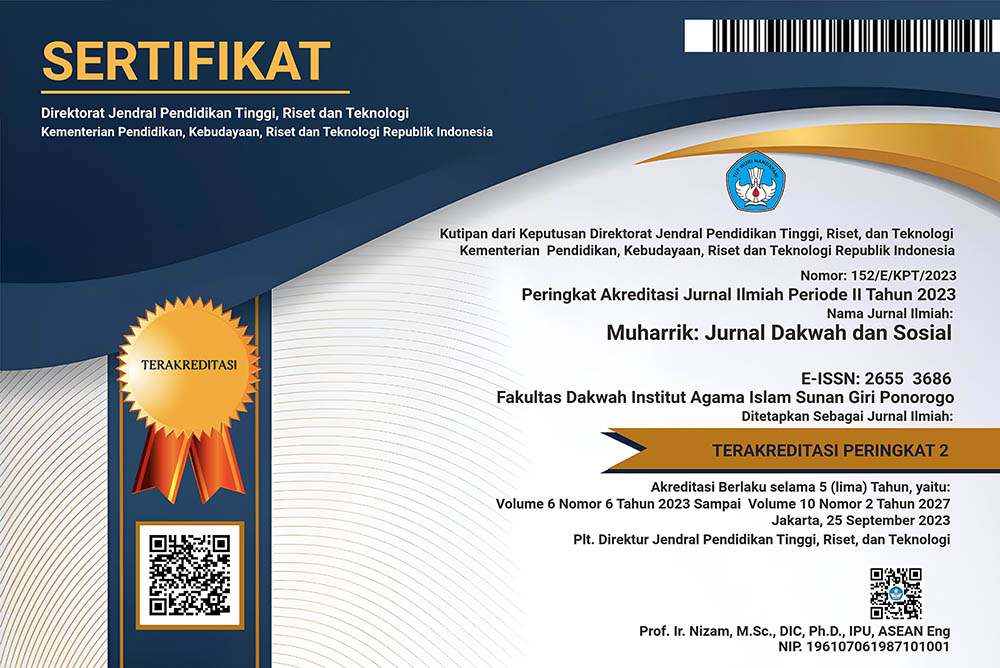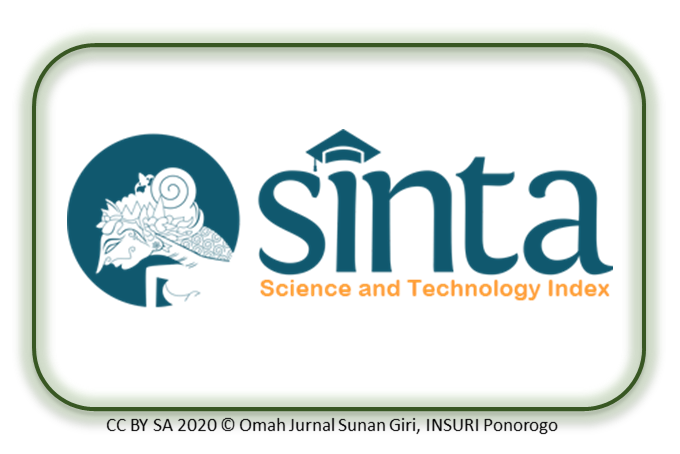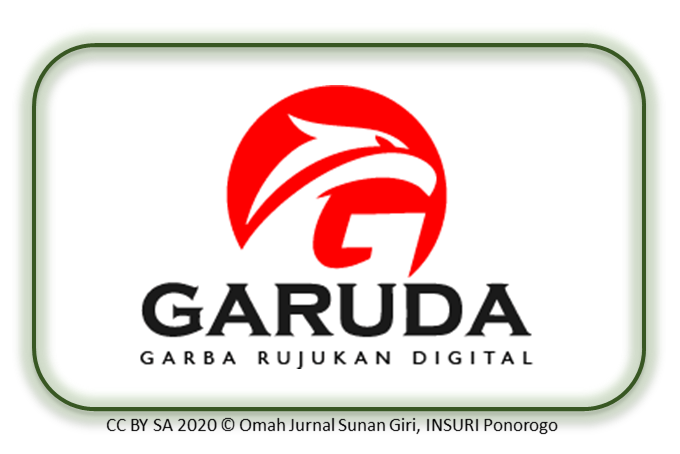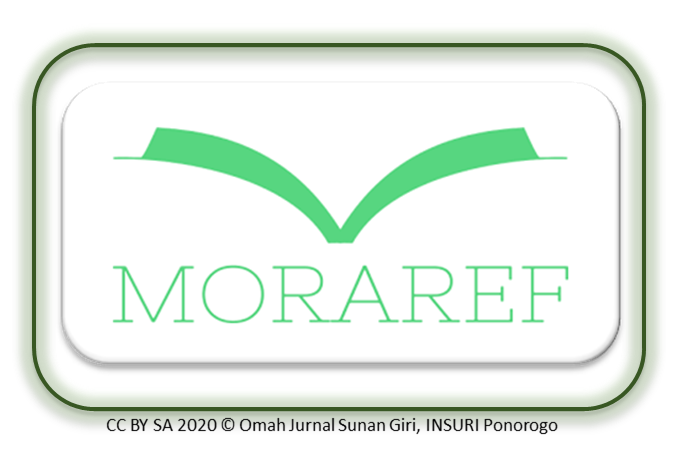Understanding Social Change in the Perspective of Da'wah on the Thought of Mohammad Natsir
Keywords:
Social Change, Da'wah, Mohammad NatsirAbstract
Mohammad Natsir is a figure of social change in strategic proselytizing thinking with its theory in its implementation. From this perspective, the thought of Mohammad Natsir finds his willingness to be appointed and analyzed. The method used is a descriptive analysis, and the data for writing this article is relevant literature. The study results found that in his proselytizing perspective, Mohammad Natsir's thoughts on the Concepts and Strategies of Social Change were: firstly, determining the purpose and function of da'wah is as shuhadā' 'alā al-nās, being a pioneer and overseer for the ummah of man and delivering man to the ultimate purpose of life, which is to worship God. Secondly, prepare a good da'wah or agent of social change to achieve perfection in da'wah's purpose. Natsir explained that a da'i must master Tafaqquh fī al-Dīn and Tafaqquh fī al-Nās. Thirdly, wisdom is the most excellent proselytizing method applied among other methods. According to Natsir, wisdom is more than mere science. It is nutritional science that has been digested and blends with a sense of check to become a driving force to make social change.
References
Aliyudin, A. (2010). Prinsip-prinsip Metode Dakwah menurut Al-Qur’an. Ilmu Dakwah: Academic Journal for Homiletic Studies, 5(15), 1007–1022.
Arkiang, F., & Adwiah, R. (2019). Konsep Dakwah Mauidhatul Hasanah dalam Surat An-Nahl Ayat 125. Murabby: Jurnal Pendidikan Islam, 2(1), 57–68.
Durhan, D. (2018). Meretas Kembali Pemikiran Muhammad Natsir (Praktek Pendidikan Integral, Harmonis Dan Universal). Al Hikmah: Jurnal Studi Keislaman, 8(1), 64–78.
Hamka, B. (2018). Prinsip dan Kebijaksanaan Dakwah Islam. Jakarta: Gema Insani Press.
Iskandar, I., & IP, S. (2015). Pemikiran Politik Muhammad Natsir Tentang Hubungan Islam dan Negara. Transnasional, 6(2), 1755–1770.
Islam, E. (1993). Jakarta: Ichtiar Baru Van Hoeve. Cet. Ke-3, Jilid II, 124.
Kafie, J. (1988). Pengantar Ilmu Dakwah. Surabaya: Karunia. Hal, 89.
Luth, T. (1999). M. Natsir, dakwah dan pemikirannya. Gema Insani.
Maulida, A. (2018). Kompetensi Pendidik Dalam Perspektif M. Natsir (Studi Analitis Pemikiran Pendidikan M. Natsir dalam “Fiqhud Dakwah”). Al-Fikri: Jurnal Studi Dan Penelitian Pendidikan Islam, 1(2), 39–46.
Mubarok, A. (1999). Psikologi Dakwah, cet. Ke-1, Jakarta: Pustaka Firadaus.
Mubasyaroh, M. (2013). M. NATSIR DAN PANDANGANNYA TENTANG DAKWAH DALAM BUKU FIQHUD DAKWAH. AT-TABSYIR STAIN Kudus, 1(2).
Muhiddin, A. (2002). Dakwah dalam perspektif Al-Qur’an: studi kritis atas visi, misi & wawasan. Pustaka Setia.
Muliati, I. (2016). Pandangan M. Natsir tentang demokrasi: Kajian pemikiran politik Islam. TINGKAP, 11(2), 129–139.
Mustar, S. (2016). KEPRIBADIAN DAI DALAM BERDAKWAH. JURNAL TARBIYAH, 22(1).
Natsir, M. (2000a). Fiqhud Da’wah. Jakarta: Media Da’wah.
Natsir, M. (2000b). Islam sebagai dasar Negara.
Priyono, A. E. (2008). Paradigma Islam: interpretasi untuk aksi. PT Mizan Publika.
Raihan, R. (2015). IMPLEMENTASI PEMIKIRAN DAKWAH MOHAMMAD NATSIR DI DEWAN DAKWAH ISLAMIYAH INDONESIA PROVINSI ACEH. Jurnal Ilmiah Islam Futura, 15(1), 67–92.
Shihab, A. (1997). Islam inklusif: Menuju sikap terbuka dalam beragama. Diterbitkan atas kerja sama AN Teve dan Penerbit Mizan.
Sumanto, E. (2021). Pemikiran Dakwah M Natsir. DAWUH: Islamic Communication Journal, 2(1), 1–7.
Suparta, M. (2019). Metode Dakwah Edisi Revisi. Kencana.
Downloads
Published
Issue
Section
License
The author(s) retain/s the copyright and grant/s Muharrik: Jurnal Dakwah dan Sosial the first publication rights licensed under the Creative Commons Attribution-NonCommercial 4.0 International (CC BY-NC 4.0) , which allows others to access (search, read, download and quote), share (copy and redistribute the material in any media or format) and adapt (mix, modify and develop) works for legitimate non-commercial purposes, with recognition of the authorship of the work and its initial publication in this journal.













